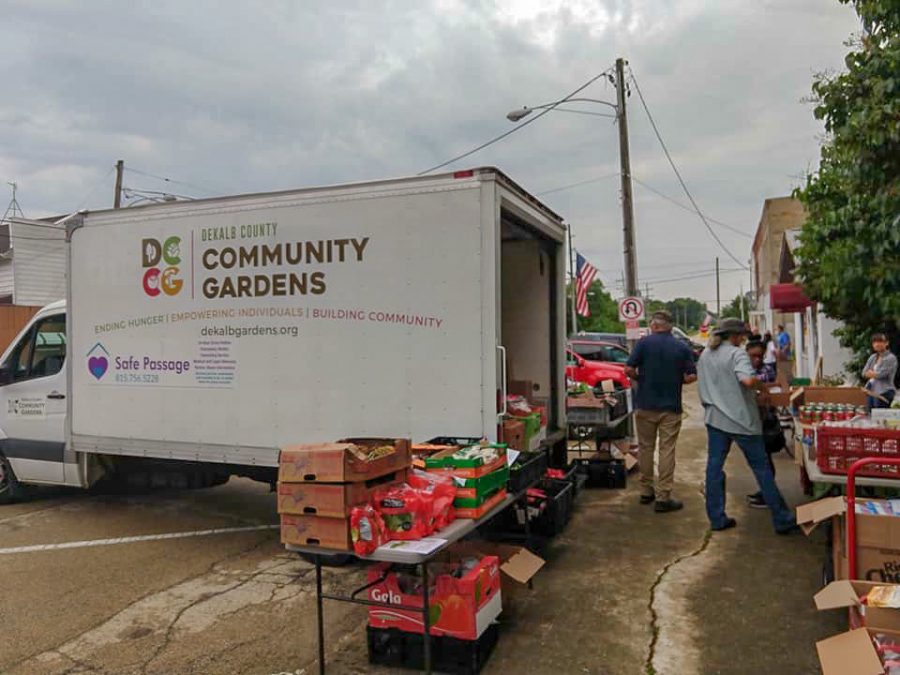Potluck pantry to accommodate federal workers amidst government-shutdown
January 23, 2019
DeKALB — The DeKalb County Community Gardens is hosting a potluck pantry for federal employees and contracted federal workers to receive free food and personal care products to aid with financial insecurities they may be experiencing as a result of the government shutdown.
Hosted in conjunction with the Welcome Essentials Pantry, the potluck is from 10 a.m. to noon Saturday at the Unitarian Universalist Fellowship Church, 158 N. Fourth St.
Dan Kenney, executive director of the DeKalb County Community Gardens, said the event is open to the public, and federal workers are encouraged to attend.
Kenney also said the Grow Mobile program his organization hosts recognizes federal employees may be experiencing these insecurities, and, as a result, he said it only made sense to provide those workers with free food.
With federal employees now missing their second paycheck, Kenney said the program is extending aid beyond the potluck and will continue to do so until and after the shutdown, as employees will still be waiting on backpay if they are to receive it.
Kenney said those in need should contact the organization and set up a time to have them deliver food products.
“It occurred to us that there are federal workers all over the county, some in DeKalb County or in our area, [who] are living without their paycheck, and we just wanted to make sure they know they can count on us to provide them with food and whatever else we can,” Kenney said.
Kenney said many Americans live paycheck to paycheck, and the shutdown could be leaving many workers vulnerable.
DeKalb Mayor Jerry Smith said despite the county’s internal government functioning without hitch, there are federal employees and contract workers with the federal government whose lives may not be proceeding as normal. Those being affected specific to the DeKalb area include farmers.
“As it relates to the city of DeKalb, we are directly affected very little,” Smith said. “I would think if there are community members impacted by government programs — farmers, those involved with food banks, certainly those who are recipients of government grants and financial distributions — those community members may be impacted.”
Comprised of 370,772 acres of farmland, making up roughly 88 percent of the county’s land base and with the partial government shutdown continuing beyond its first month, the 3,210 farmers and farm owners in the county are seeing their lives disrupted by the shutdown as well.
Farmers in DeKalb could be affected by the shutdown as a result of stinted operations of the U.S. Department of Agriculture. While the production of farm product itself is not altered in any way, it is the farmers’ communication with the federal department affecting their lifestyles.
Greg Millburg, DeKalb County Farm Bureau manager, said with the shutdown, farmers are unable to receive the benefits of the new Farm Bill.
He said they can still apply for benefits and loans, but there is no one working to approve those things, and the effect will only become more apparent as time wears on.
“At this point, [the government shutdown] is mainly impacting farmers,” Millurg said. “The longer we go it will affect more people and situations, but for the most part it’s affecting agricultural producers in the county.”
Millburg said along with the Department of Agriculture, the Farm Service Agency has been shut down. The agency serves DeKalb County as well as DuPage and Kane Counties and is one of two USDA agencies with branches at the DeKalb Farm Bureau.
Among the two agencies with branches at the DeKalb Farm Bureau, more than a dozen people are employed. These aren’t the only federal jobs in the county affected by the shutdown, as an estimated 40,000 workers in Illinois are currently unemployed or working without pay.
“The local farmers are seeing some effects of this because now farmers have to wait for the [Farm Service Agency] office to open to be able to get anything done,” Millburg said. “If they don’t have someone there, they can’t do that. They can fill out the application, but no one will review it until work starts back up.”



